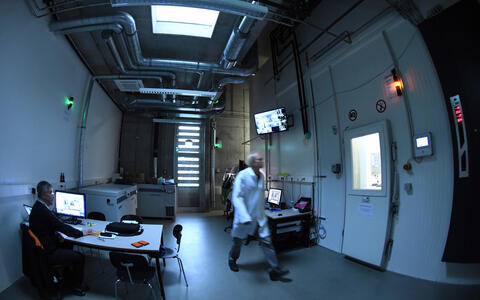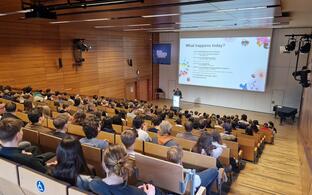Biobank
Tobias Pischon
Profil
The biobank, part of the Berlin Institute of Health, which is a joint undertaking of the Max Delbrück Center and Charité – Universitätsmedizin Berlin, can support any type of research study that requires state-of-the-art storage of liquid biological samples.
This includes cohort studies and clinical trials, but also experimental research projects involving, for instance, stem cells. Specimens are stored at temperatures below ‒160°C in the vapor phase of liquid nitrogen in a fully automated robotic system. This allows high-quality storage as well as swift identification and efficient retrieval of samples for analysis.
Inside the biobank building
Identifying biomarkers of human disease
Currently, the biobank stores samples from 30,000 individuals in Berlin and Brandenburg who are taking part in the German National Cohort, a large nationwide epidemiological study.
The project aims at elucidating the mechanisms of major chronic diseases, with several assessments of clinical and biological data to be performed in the years up to 2023, thus enabling researchers to explore the associations between biomarkers and the risk of incident health problems.
Our group is also participating in a study to identify biomarkers for postoperative cognitive impairment in elderly patients. The study is supported by the research framework program of the European Union. The platform also supports the various research studies and trials of the Berlin Institute of Health.
Our tools
- Cryo-workbench for manually handling and scanning samples at ‒80°C
- Fully automated storage in the vapor phase of liquid nitrogen
- Laboratory information management system for sample tracking, history, and data connection
Team
Equipment and infrastructure
An infrastructure to reliably preserve and retrieve biological samples
Many medical research projects make use of biological specimens such as blood, urine, tissue samples, cells, or DNA, which have to be stored over time.
For example, clinical and epidemiological studies may aim at exploring long-term correlations between specific genetic and metabolic characteristics (biomarkers) and the development of disease.
This requires an infrastructure – a biobank – to reliably preserve and retrieve probes when necessary. Biobanks allow researchers to archive biological information for planned as well as unforeseen future use.
High-quality storage at ultralow temperatures
Our platform currently encompasses two large-dimension liquid nitrogen tanks with a capacity for 2.5 million 250-µL tubes as well as tubes of 700 µL, 1000 µL, and 2 ml. The handling procedures guarantee that the cold chain is not interrupted when transferring samples into the biobank.
A cryo-workbench for manually handling and scanning samples at ‒80°C
A laboratory information management system provides full documentation, including sample characteristics, storage conditions, project information, and analysis results.
In addition, our group offers advice for research projects using biosamples when it comes to study design, standard operating procedures, data protection, and ethical issues. We also offer DNA or RNA extraction.





